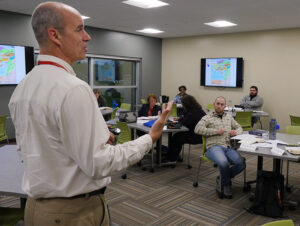Lancaster Bible College takes seriously its mission to educate Christian students to think and live a biblical worldview and to proclaim Christ by serving Him in the church and society. But one must ask the question: How can you prepare students to flourish while also encouraging and equipping the faculty who are instructing them? The answer is why LBC’s Center for Teaching & Learning works to provide relevant and impactful training and development for faculty to be at their best for students.
Dr. Justin Harbin, Director of the Center for Teaching & Learning, believes in the power of building up faculty so that they can in turn build up students. “The long-term data and metastudies available strongly indicate that the single most impactful factor on student learning and retention is the quality of faculty teaching,” Harbin said. “We ask our faculty to not only teach with excellence but also to engage in the ‘double work’ of integrating our faith into curriculum, instruction and classroom strategies.”
As LBC tagline says, administration, faculty and staff earnestly hope that students “Experience Different” as they pursue their education. One of the differentiators that sets LBC apart is a commitment to “Relational Education,” whereby faculty and staff tailor their interactions to students’ unique interests, gifts and talents and help align them with God’s calling. Investing in tomorrow’s leaders, dedicated professors help students discern and develop their potential, making a degree from LBC a valuable aspect of their future — wherever God calls them.

Dr. Gordon Gregory (’82) teaches a class in the School of Bible & Ministry at LBC.
To that end, the Center has put in place a variety of faculty supports that are consistently growing at LBC. These supports have been divided into tiers to properly meet the needs faculty in all stages of their careers, both in teaching and theological integration. Additionally, all new faculty members are required to attend bi-weekly meetings with a learning community throughout their first year, as they are also paired with a mentor for further support and enrichment.
Some of the CTL’s offerings for LBC’s Spring 2025 semester include the following:
- Compelled to Teach Blog: Welcomes several LBC faculty guest contributors to think more deeply about the intersection of faith and teaching through their writing.
- Lancaster Learns Conference: Provides a chance to meet and collaborate with colleagues from every institution in Lancaster County and beyond around issues and innovations within higher education teaching and learning. The 2025 conference was held Feb. 28 at Saint Joseph’s University’s Lancaster location.
- Spring Faculty Workshop: LBC faculty will join their colleagues on April 21, 2025, to collaborate, hear new ideas, embrace shared challenges and encourage one another in the excellent work of faithful Christian teaching, scholarship and service.
- Faculty Consultation: The CTL offers one-on-one or group consultation on a variety of instructional levels or topics. Lancaster Bible College faculty who are considering brainstorming assessment ideas, struggling with a particular part of their teaching and instruction, or who are looking for new ideas can contact ctl@lbc.edu.
- Faculty Resource Center: Professors and instructors can find resources, how-to videos and readings on current needs relating to higher education and Christian teaching practices. Resources on topics such as concerns surrounding artificial intelligence, faith-learning integration and completing assessment annotations can be found on an online Faculty Resource Center hosted by the Office of Digital Learning and the Center for Teaching & Learning.
Harbin went on to explain that these efforts are important because they invite cross-disciplinary collaboration. He expressed his desire to continue to help faculty make their teaching the best it can be. Professors can reach out digitally or stop by his office for anything from a quick question to full-on consultations, classroom observations or other instructional coaching.
Additionally, the Office of Digital Learning at LBC assists online faculty members in their teaching efforts. This year, the ODL began a faculty training series to focus on establishing regular opportunities for online faculty to develop their teaching skills and to build community. Throughout the year, the ODL will present pertinent, data-informed topics facilitated by experts to offer online faculty opportunities to be engaged as both teachers and learners in the LBC online community.
On the lighter side, new BYOL (Bring Your Own Lunch) sessions for both faculty and staff allow employees to enjoy a casual get-together for fellowship and community as they also get to know those outside their departments.
